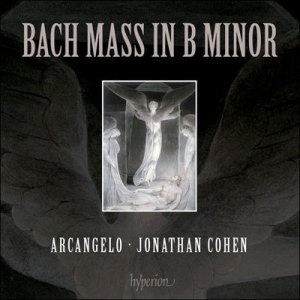If you happened to miss this B minor Mass release a couple of years ago as I did, and if you’re a fan of this work, you should make an effort to at least hear it, after which I believe you will want a copy for yourself. While this performance does not feature one of the “big-name” orchestras and choirs, nor are most of the soloists among the usual, immediately recognizable Bach oratorio specialists, none of that matters here: this is perhaps the finest B minor Mass on disc, owing not only to its uniformly first-rate performers and their dynamic, always engaging playing and singing, but to its apt tempos and expertly managed transitions from movement to movement; its carefully set and sustained balances among and between choir and orchestra; and the consistently pleasing, vibrant sound–of instruments, of choir, and of the soloists with their various accompaniments.
Compared with other performances–including a couple that have been at the top of my list (Bernius on Carus; Brüggen on Glossa)–the effect of Arcangelo conductor Jonathan Cohen’s tempo in the opening Kyrie is comparable to Otto Klemperer’s beginning chorus in his uniquely ravishing, enduring classic St. Matthew for EMI: slower without ever feeling “slow”; what Cohen (like Klemperer) has done is to find the optimum tempo for his forces and for Bach’s music–and the result is nothing less than to release the music’s sensual–and if you are so inclined–spiritual power. Just to put this in perspective, Bernius runs the Kyrie at 9:32; Brüggen at 9:30; Cohen does it in 10:31. The difference is so striking that, once heard, it’s hard to go back.
There are many other equally illustrative comparative momemts throughout the performance, but the point is this one stands all on its own as a supreme example of how such an oddly constructed and historically controversial work can be artfully, intelligently conceptualized to render it as a unified musical and, considering Bach’s possible motivations for its creation, defining masterpiece.
I hadn’t heard of several of these soloists before, but they are all excellent, most notably soprano Ida Falk Winland in the Laudamus te, and soprano Lydia Teuscher and tenor Samuel Boden in the Domine Deus duet–but that may unfairly slight bass Neal Davies and countertenor Tim Mead, who deliver their own faultless performances.
Cohen very smartly employs a 20-voice chorus (composed of some of Britain’s top choir singers)–none of this single-voice per part nonsense!–and a comparably, sensibly matched period orchestra. Unlike some other recordings, in this one you really notice and appreciate not just the chorus, but the orchestra and its sound–the rich and resonant strings! the colorful, characterful winds, in sections such as the Domine Deus!–and you will remark on the exceptional precision and sensitivity displayed by all concerned. You will also likely agree that this isn’t just another recommendable version of this oft-recorded work, but the recommended version.
































